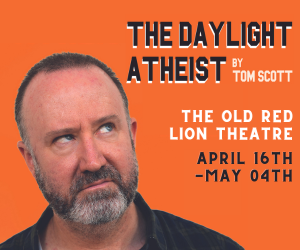The scene is set in dementia sufferer Claire Conomor’s care home. While her visiting children - David and Emily - are there, she is spoken about but rarely to. Claire proceeds to stare off into the distance, get the shakes and demand to be taken to Paris. Soon though, there is a subtle change in lighting and we are transported into Claire’s psyche. Through realms of fantasy and memory, we are introduced to Claire’s younger self, while David and Emily transform into figures of their mother’s past. Here, we are given snapshots of the decisions Claire has made in her life. The flashbacks are comic and tragic in equal measure thanks to the script’s wit and psychological scrupulousness. It is a tribute to the cast, the script and the tech that these flickering journeys between past, present and fantasy seem effortlessly natural and manage to recreate on some level the confusion of the dementia sufferer’s mental time travel.
This is a real triumph of new writing. The script is clever and touching without sentimentality. David’s and Emily’s question of what can be done with their near-vegetable mother runs alongside the question of their mother’s past decisions vis-a-vis her marriage to their father, Joe. The siblings disagree on both fronts and your perception of the pair twists and turns throughout. David wants to keep their mother alive despite her total inability to communicate, Emily thinks otherwise. While initially David seems the more calm, sensitive and even loving offspring, with Emily the more selfish and hostile one, the plot unfolds to reveal Emily’s true understanding of Claire. Ultimately, it is the daughter who comes across as simultaneously the most brutal and merciful. The great thing about this play is that it will give you something to discuss after the show. No doubt many readers will disagree with my interpretation and there is room to argue for David’s insistence on hanging on. The vividness of the flashbacks certainly show that there is a mind racing behind Claire’s perplexed exterior, making her case seem substantially less hopeless.
This central conflict was portrayed well by Claire Bowman and Howard Coase, who gave entirely naturalistic, embodying renditions of Claire’s daughter and son. The pair were also amusing or appropriately passionate as the tenants of Claire’s memory. The only concern is that, with a script that requires two actors to play up to ten different characters, there is a great need for variation and scope in performance. Whilst many of the characters were distinct, often with wholly new ways of speaking and moving, there were moments where they blended. Howard Coase as Claire’s son and Claire’s ex-husband, then as her posh university friend and her schoolteacher, seemed a little too similar. Although, this may have been a directorial choice in order to further recreate Claire’s confused perception; she does indeed mistake her son for her ex-husband.
However, it was Becky Banatvala’s performance as the headstrong, fashionable and lost younger Claire that was the most entertaining and touching. Banatvala’s performance as the senile Claire, a role which easily could have been played distastefully was also nuanced. It was Banatvala’s ability to switch between the two with ease and vitality that made this production so delightful. Indeed, for a play about dementia, it was a joy to watch and one certainty is that Howard Coase and Douglas Grant’s play about forgetting is one to remember.










